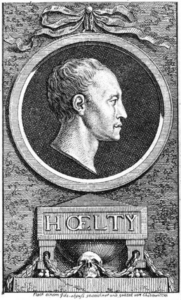Early love
(Poet's title: Die frühe Liebe)
Set by Schubert:
D 430
Schubert did not set the lines in italics[May 1816]
Schon im bunten Knabenkleide,
Pflegten hübsche Mägdelein
Meine liebste Augenweide,
Mehr als Pupp’ und Ball zu sein.
Ich vergaß der Vogelnester,
Warf mein Steckenpferd ins Gras,
Wenn am Baum bei meiner Schwester
Eine schöne Dirne saß;
Freute mich der muntern Dirne,
Ihres roten Wangenpaars,
Ihres Mundes, ihrer Stirne,
Ihres blonden Lockenhaars.
Blickt’ auf Busentuch und Mieder,
Hinterwärts gelehnt am Baum;
Streckte dann ins Gras mich nieder,
Dicht an ihres Kleides Saum.
Was ich weiland tat als Knabe,
Werd ich wahrlich immer tun,
Bis ich werd im kühlen Grabe
Neben meinen Vätern ruhn.
Even when I was still wearing bright children’s clothes,
Pretty girls used to be
My preferred treat for the eyes,
More than dolls or balls.
I forgot about birds’ nests,
I threw my hobby-horse into the grass,
Whenever my sister was by the tree
With a beautiful lass sitting next to her;
I used to enjoy the cheerful lass,
Her pair of red cheeks,
Her mouth, her forehead,
Her blond hair falling in locks;
I used to look at the blouse and bodice
As she was leaning back against the tree;
I would then lie down in the grass
As near as possible to the hem of her dress.
What I formerly did as a lad,
To be honest I shall always do it,
Until I am in my cool grave
Resting next to my ancestors.
All translations into English that appear on this website, unless otherwise stated, are by Malcolm Wren. You are free to use them on condition that you acknowledge Malcolm Wren as the translator and schubertsong.uk as the source. Unless otherwise stated, the comments and essays that appear after the texts and translations are by Malcolm Wren and are © Copyright.
☙
Themes and images in this text:
Balls Birds Brothers and sisters Cheeks Children and childhood Clothes Games and play Grass Hair Mouths Nests Red and purple Trees (general)
“I was still in short trousers” might be how some English speakers would begin such a story. He cannot remember a time when he was not attracted to girls and he cannot imagine a time when he won’t be. It is just who he is, he says.
When he recalls these first erotic adventures he cannot help associating them with clothing. He himself was wearing bright kids’ clothes, and he can remember every detail of his sister’s friend’s blouse (literally ‘breast-kerchief’) with the bodice fastened across it. He used to snuggle up to the hem of her skirt. The fact that he is so fixated on these outer garments might lead us to conclude that he never touched or removed any of the girl’s clothing, and that he never acted on any of his fantasies (which could explain why they are still so powerful). We should not be surprised if he turns out to be a virgin for all his swagger.
☙
Original Spelling Die frühe Liebe Schon im bunten Knabenkleide, Pflegten hübsche Mägdelein Meine liebste Augenweide, Mehr als Pupp' und Ball, zu sein. Ich vergaß der Vogelnester, Warf mein Steckenpferd ins Gras, Wann am Baum bey meiner Schwester Eine schöne Dirne saß; Freute mich der muntern Dirne, Ihres rothen Wangenpaars, Ihres Mundes, ihrer Stirne, Ihres blonden Lockenhaars; Blickt' auf Busentuch und Mieder, Hinterwärts gelehnt am Baum; Streckte dann ins Gras mich nieder, Dicht an ihres Kleides Saum. Was ich weiland that als Knabe, Werd' ich wahrlich immer thun, Bis ich werd' im kühlen Grabe Neben meinen Vätern ruhn.
Confirmed by Peter Rastl with Schubert’s source, Gedichte von L. H. Ch. Hölty. Neu besorgt und vermehrt von Johann Heinrich Voß. Wien, 1815. Bey Chr. Kaulfuß und C. Armbruster. Gedruckt bey Anton Strauß. Meisterwerke deutscher Dichter und Prosaisten. Drittes Bändchen. pages 145-146; with Gedichte von Ludewig Heinrich Christoph Hölty. Besorgt durch seine Freunde Friederich Leopold Grafen zu Stolberg und Johann Heinrich Voß. Carlsruhe, bey Christian Gottlieb Schmieder, 1784, pages 142-143; and with Poetische Blumenlese für das Jahr 1777. Herausgegeben von Joh. Heinr. Voß. Hamburg, bey Carl Ernst Bohn, page 166.
This is the version of Hölty’s poem heavily reworked by Voß.
To see an early edition of the text, go to page 145 [223 von 300] here: http://digital.onb.ac.at/OnbViewer/viewer.faces?doc=ABO_%2BZ15769170X


